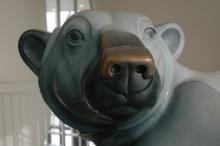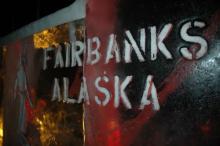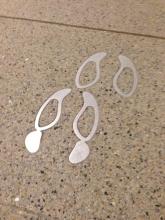Update
Now Archived!
The PolarConnect events with Michael League and the research team from McMurdo Station, Antarctica are now archived.
You can access these events by visiting the PolarConnect Archives.
What Are They Doing?
The research team SCUBA dived below the sea ice to collect polychaete worms. Polychaetes are segmented worms generally less than 10 centimeters (3.9 inches) long, but can vary greatly. They are marine worms that live throughout the world’s oceans and can survive in very harsh conditions including the deepest depths of the ocean.
Once the worms were collected, the research team ran temperature and nutrition experiments on them in the laboratory. These experiments helped researchers understand how the worms are able to adapt to these very cold waters, and how they will survive as ocean temperatures increase.
Where Are They?
The team was based in McMurdo Station, Antarctica. McMurdo Station is on Ross Island, a volcanic island (with the southernmost active volcano, Mt. Erebus) south of New Zealand in the Ross Sea. Researchers took day trips from McMurdo Station to local under-ice SCUBA diving sites.
Latest Journals

Dr. Stacy Kim is a research professor in Benthic Ecology, or how organisms that live on the seafloor interact to form communities. She has worked with Dr. Adam Marsh in both Antarctic and hydrothermal vent ecosystems, and will be diving on this project to help collect worms, as well as to continue assembling data to examine long term changes in Antarctic ecosystems. When she is not studying human impacts in marine communities and developing technology for underwater research, Stacy enjoys backpacking, climbing, and beach volleyball.
Adam Marsh is an associate professor in the School of Marine Science and Policy at the University of Delaware, who has conducted field research in Antarctica for the last 15 years. His work focuses on marine life in extreme conditions, including cold adaptations in polar animals and bioengineering proteins to function in extreme conditions. Dr. Marsh also co-founded a biotech startup company. To learn more about Dr. Marsh, please visit his faculty homepage.

Stephanie Guida received her B.A. in environmental chemistry from Juniata College in 2007 and is currently a Ph.D. candidate in marine biosciences at the University of Delaware. This is her second field season studying genomic and physiologic adaptations in marine worms to the extreme Antarctic environment. Her main research interest is looking at shifts in gene regulation during acclimation to environmental changes. When not working in the lab, Stephanie enjoys rock climbing, mountain biking, and hunting for sea glass along the Delaware beaches.

Annamarie Pasqualone received her B.A. in biology and environmental studies from Vassar College. She is now on her second year of the PhD program at the University of Delaware, where she studies the physiological and biochemical changes associated with acclimation to extreme environments. She is very fascinated by the ways in which environmental cues trigger changes in gene expression that ultimately allow the animals to survive. This is Annamarie's second field season in McMurdo, and she is very excited to start collecting and culturing the lab's model organism, Capitella perarmata. While on the coldest continent on earth, Annamarie spends her free time hiking up Observation Hill, touring pressure ridges, and exploring ice caves. Off the ice, Annamarie enjoys line dancing and taking her cat, Purrsia, for walks on the boardwalk.




